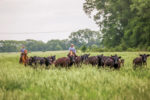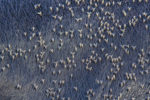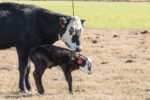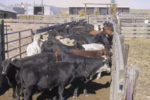Cattle Health
Liver flukes were once considered a wet region parasite. However, now not only are they found in the wet regions of the Gulf and Pacific coasts, but producers are dealing with them across the country.
Read More
NCBA presentations share the importance of herd health as we build back the cow herd
As we build back the cow herd in the coming years, herd health is going to be increasingly important. Protect your operation from harmful diseases and prepare it for a successful transition.
Read More
The strategic management of anaplasmosis
Anaplasmosis, a disease spread by ticks and biting horseflies, has been historically seen in the southeastern U.S. Concerned experts report this infection is expanding to more states. Learn what the specialists say about the causes, symptoms and treatment for this noninfectious disease.
Read More
Don’t gamble with your herd’s reproductive health: The value of breeding soundness exams
Be sure not to skip the breeding soundness exams on your herd sires, which is pivotal to ensure reproductive success on your operation.
Read More
Defending cattle from parasitic hitchhikers
A defined deworming program, along with the right nutrition, will help protect against parasitic worm infection in both cow-calf and feedlot applications.
Read More
Maximize immunity, decrease disease with these five calf health considerations
To give your calves the best chance right out of the gate, pay attention to prenatal nutrition and herd health, and have your post-birth care in place.
Read More
Using mRNA vaccines in meat animals Part 2: Do these vaccines hold promise or health concerns?
Messenger RNA vaccines have the potential to fill a gap in animal disease coverage, but more progress needs to be made before a vaccine for cattle is developed.
Read More
Navigating interstate regulations for bull sales
With bull buying and breeding season approaching rapidly, it is important to ensure the health of your bulls, especially during sale season when movement of breeding livestock is at its peak and on a tight schedule.
Read More
Persistently infected calves invading the cattle industry
A persistently infected calf occurs when BVD infects a fetus during pregnancy. These calves will not be able to mount an immune response to kill the virus at any point in their lives and will shed the virus, endangering the other cattle around them.
Read More
Killed vs. modified-live vaccines: Which type is right for your operation?
Vaccines are an essential part of many herd health programs. Understanding the key differences between vaccine types can help you create a safe and effective vaccination program that matches the disease exposure risk for cattle on your operation.
Read More









